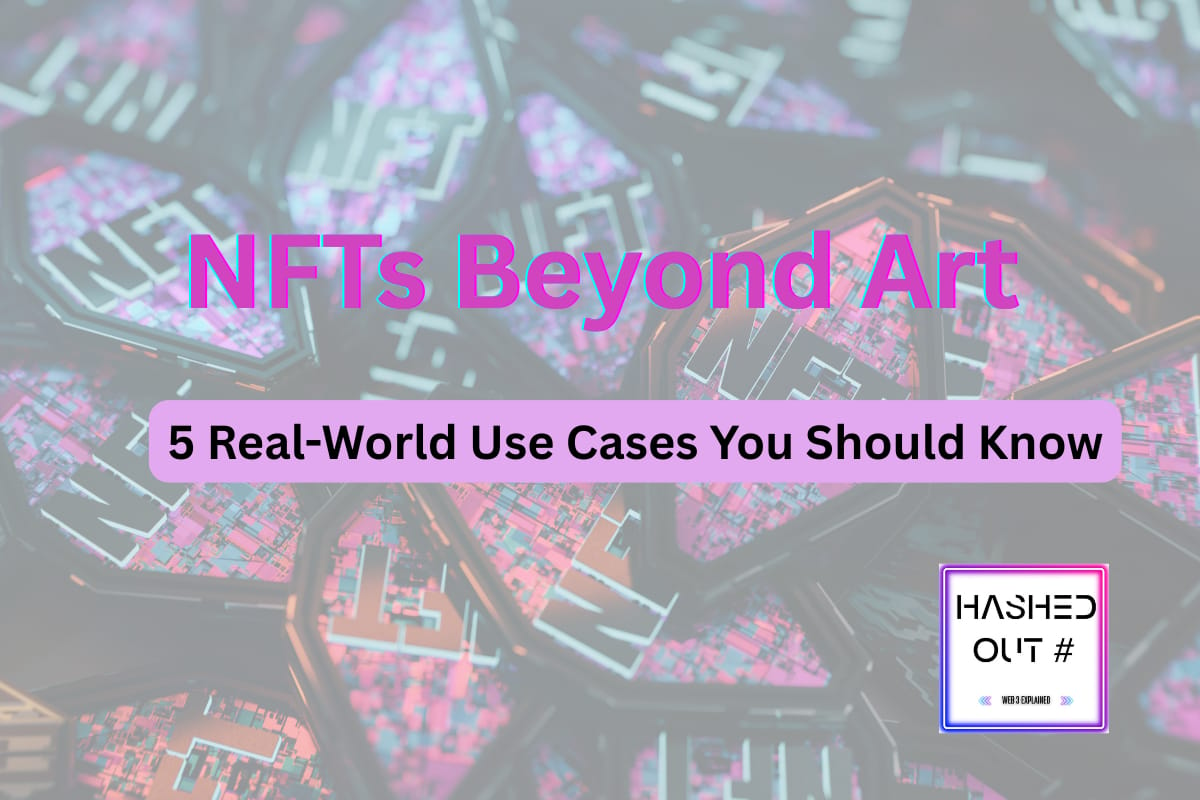- Hashed Out
- Posts
- NFTs Beyond Art: 5 Real-World Use Cases You Should Know
NFTs Beyond Art: 5 Real-World Use Cases You Should Know
A quick guide to how NFTs are quietly becoming part of everyday life.

NFTs had their fifteen minutes of fame — and then some. But beneath the hype, the technology itself kept evolving. What began as a way to trade digital art has become a powerful tool for verifying ownership, access, and identity across countless industries.
This short guide highlights five ways NFTs are being used right now to solve real-world problems. From property deeds and airline rewards to gaming and digital credentials, these examples show how NFTs are quietly transitioning from buzzword to backbone technology.
Let’s take a closer look.
1. Real Estate: Turning Property Into Digital Assets
Buying or selling a home has always been slow, expensive, and wrapped in red tape.
NFTs are changing that by representing property deeds and ownership records on the blockchain.
How it works:
Each property is “tokenized” as an NFT that carries its verified ownership record.
Ownership transfers happen through secure blockchain transactions—no piles of paperwork.
Example: Platforms like Propy and Roofstock OnChain have already sold homes as NFTs, proving that title transfer can happen in minutes, not months.
Why it matters:
Reduces fraud
Increases liquidity
Cuts costs for buyers and sellers
2. Loyalty & Membership: Turning Customers Into Communities
Forget plastic cards and complicated points apps. NFTs let brands create memberships that live in your digital wallet.
How it works:
Each NFT represents a unique membership or loyalty credential.
It can unlock real-world perks, digital rewards, or exclusive experiences.
Example: Lufthansa’s Uptrip lets travelers collect NFT “cards” from destinations they fly to, and completing sets unlocks lounge access or free upgrades.
Why it matters:
You own your loyalty credentials
Rewards become more flexible and portable
Brands gain deeper, more authentic engagement
3. Gaming: True Ownership of Digital Items
For decades, gamers have bought items that live—and die—inside a single game.
NFTs make those assets truly yours.
How it works:
Game items (skins, weapons, avatars) are minted as NFTs on a blockchain.
Players can trade, sell, or carry them across compatible games or platforms.
Example: Immutable X and Polygon are powering NFT-based games where players actually own their assets.
Why it matters:
Players gain real ownership of digital value
Opens new creator-driven economies
Enables resale or interoperability between titles
4. Identity & Credentials: The New Digital ID
NFTs are proving useful far beyond collectibles—especially in verifying who we are.
How it works:
Credentials like diplomas, certifications, or event passes are issued as NFTs.
They’re verifiable on-chain, tamper-proof, and permanently tied to your digital wallet.
Example: Universities and professional groups now issue blockchain diplomas or “soulbound tokens” that can’t be sold or faked.
Why it matters:
Simplifies verification (no more lost paperwork)
Prevents fraud
Gives individuals control over their identity data
5. Ticketing & Events: A Better Way to Prove You Belong
If you’ve ever worried about scalped tickets or fake QR codes, NFTs offer a fix.
How it works:
Each ticket is minted as an NFT, storing proof of authenticity and ownership.
Event organizers can control resale, royalties, or perks (like backstage access).
Example: Coachella and NFL experiments have used NFT tickets to offer lifetime passes or digital mementos.
Why it matters:
Reduces fraud
Adds collectible and experiential value
Gives fans a verified proof of attendance
The Big Picture
NFTs are moving from speculation to infrastructure.
They’re not just about buying art—they’re about proving ownership, access, and identity across the web.
The next time someone says “NFTs are dead,” just smile and ask:
“Are you sure your loyalty points, house title, or diploma didn’t come from one?”
✳️ Bonus Tip:
If you’re a business owner, creator, or professional exploring NFTs, think less about selling and more about connecting.
NFTs work best when they create value, trust, and belonging—not just buzz.
Stay ahead of the curve with the latest in Web3 culture and innovation. Subscribe to Hashed Out for exclusive insights, case studies, and deep dives into the decentralized future.
Other Articles In This Issue:
